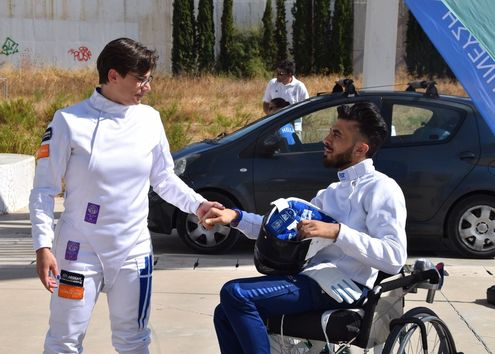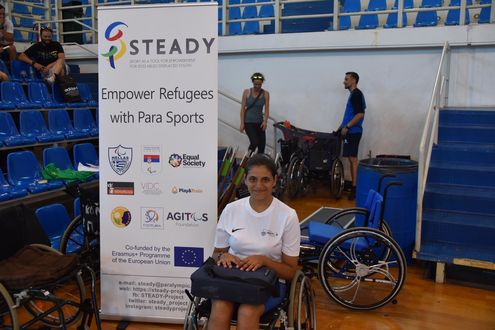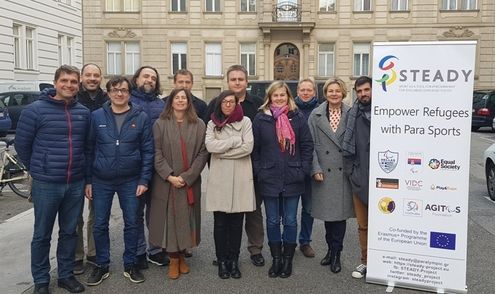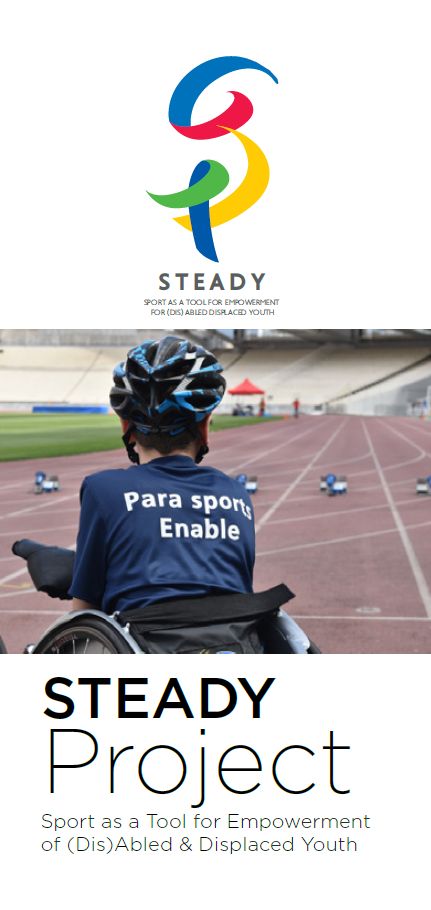The topic refugees & disability came into international focus at the Paralympics in Rio 2016, when a team of refugees with physical and visual impairments started under the banner of the International Paralympic Committee, the Independent Paralympic Athletes (IPA). There will also be an IPA team at the Tokyo 2020 Paralympic Games (25th August - 6th September 2020).
One of the key challenges currently facing Europe is the question of social integration of migrants and refugees. And here sport can be of tremendous relevance. Sport and physical activity provides refugees with or without disability an opportunity to find and show their talents and challenge commonly-held stereotypes. The unique ability of sports to transcend linguistic, cultural and social barriers makes it an excellent platform for strategies of inclusion and adaptation.
The vision of the three-year STEADY project (2019-2021) is to increase sports participation of displaced youth with disabilities (DYDs) by promoting equal access of migrants & minorities to Paralympic and grassroots sport. The acronym STEADY stands for “Sports as a Tool for Empowerment of (Dis) Abled & Displaced Youth”. STEADY attempts to change the paradigm, bringing migrants and refugees with disabilities from the margins to become integral members of the sporting community.
The consortium of the project consists of the following partners:
Project leader Hellenic Paralympic Committee (HPC) and Equal Society from Greece, Serbian Paralympic Committee, Attivamente (Italy), fairplay Initiative at VIDC from Austria, Play and Train (Spain), Centro Social de Soutelo (Portugal), Footura (Bulgaria) and the Agitos Foundation, the development arm of the International Paralympic Committee (IPC) based in Bonn, Germany. Each partner has an experience which will bring unique input to the project.
Following a meeting in Barcelona a second partner meeting took place on December 9th and 10th, 2019 on the premises of VIDC. In Vienna the Austrian Paralympic Committee (ÖPC) and the European Paralympic Committee took part in an exchange.
Kurt Wachter, head of fairplay said:
“Even if refugees and asylum seekers with impairments are not really visible to the public, they run the double risk of being marginalized and excluded from social activities. Sport can contribute to the social inclusion of marginalized groups and positively change the lives of refugees with disabilities."
Activities and measures
The measures include a baseline study on the access, participation and exclusion of disabled and refugee young people in European sport. The development of a European quality label and training to support voluntary work of refugee youth - with and without disabilities - in sport. The creation of two handbooks, one with recommendations for the social inclusion of disabled refugees through sport and a second one to support refugee youth in parasport.
Other measures include holding round tables and workshops and training voluntary ambassadors and implementing a media project that supports the integration of refugee youth with disabilities in sports.
In summer 2021, games and sports festivals will be held in all seven partner countries at the same time. Disabled and non-disabled young people and children - with or without experience of flight - take part in these integrative Grassroots Games festivals. As part of the European Week of Sport in September 2021, there will also be specific STEADY activities in all countries. At the end of the project, an international network conference on the topic will take place in Athens in November 2021, at which the political recommendations will also be presented.
Expected results
- Increase networking and sharing of best practices among European & national sport stakeholders how to pro-actively involve refugees and migrants with disabilities in and through sport
- Greater awareness and knowledge about appropriate methods among sport administrators how to counter the social exclusion of refugees and migrants with disabilities in their associations or clubs
- Learning from paralympic sports organizations and transfer of knowledge to other sports on mainstreaming intercultural action and equal opportunities’ policies
- Empower and capacity-build sport clubs and sport federations to support initiatives including refugees and asylum seekers in order to participate in regular paralympic sports competitions.
Contact
STEADY Project
c/o Hellenic Paralympic Committee
Tel: +30 2106800873 | +30 2106800562
steady[at]paralympic.gr
www.steady-project.eu
Facebook: STEADY-Project
Twitter @steady_project



